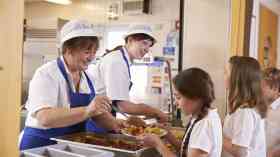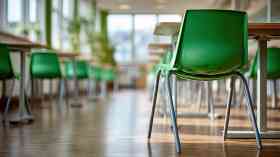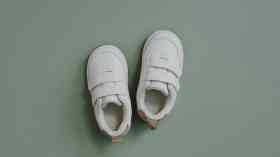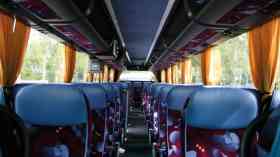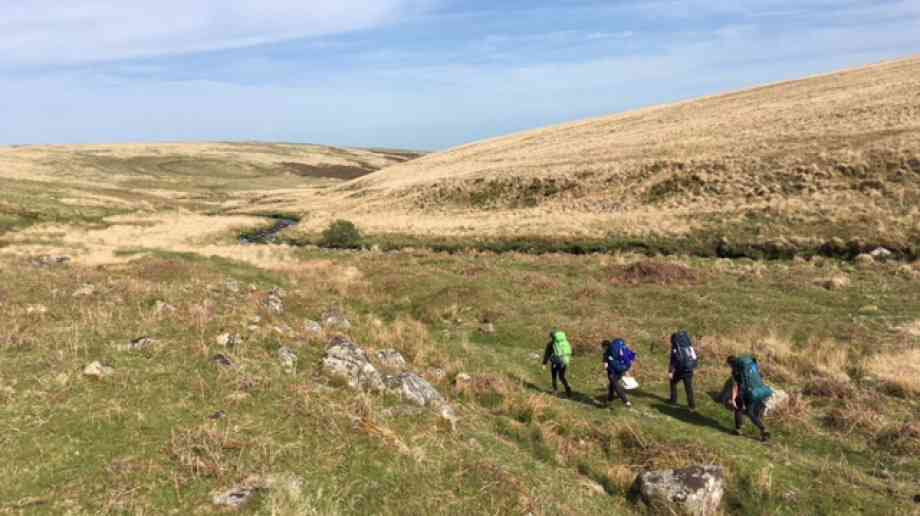
Restoring lost connections
Phil Avery from Bohunt Education Trust argues how an outdoor programme, led by holistic aims rather than performance measures, has the potential to help self, school and system
The satellite call is over quickly as discussion isn’t needed; it’s time to run away – again. Every time I’m on an expedition in Greenland with students we must scarper from something. Last time it was an inhabited bear den we had unwittingly camped too close to. This time it’s a storm bearing down on us that might (did) go on for days. As the teacher on the expedition it’s (apparently) my job to tell the shattered team, who have been sledge-hauling most of the day, that we’re walking through the night to get to safe ground.
Despite the cold and wet of the receding glacier we’re slumped on, I have a warm feeling inside as I’m certain we’re fulfilling what the Education Endowment Foundation suggests is the link between outdoor, adventurous activity and months of additional academic progress – high levels of physical and emotional challenge!
The ‘why’
Bohunt Education Trust (BET) is a multi-academy trust of eight comprehensive secondary schools - just over 10,000 students.Our outdoor programme is a critical part of developing students who are game-changers – which is the Trust’s vision.
The outdoor opportunities we provide, our drive to improve the biodiversity of our school sites and the networks of incredible people/organisations we draw our young people into mean they leave us more intrinsically motivated and able to change things for the better. In this article I outline what our programme involves, the benefits and some thoughts for those of you who are reviewing or starting your own outdoor programme.
The ‘what’
Both the internal and external components of our programme are designed to be progressive and together should normalise being outside: something that isn’t as prevalent as perhaps we think it is. If students participate in all aspects of our programme, they will miss more than five weeks of standard curriculum time, as well as weekends and part of their holiday. We see that as a positive for learning.
The ‘how’
Appropriately skilled staff with capacity is critical. BET employs a head of outdoors to lead our outdoor classroom and bushcraft work and a Duke of Edinburgh (DofE) manager to lead our DofE Operating Authority. Each school has people responsible for the outdoor classroom and DofE, with administration support, as necessary. Some schools have additional leadership, for example a head of ecology, to ensure work being done outdoors is rigorous and links to the timetable. There is then an army of teachers, support staff and parents that lead groups through the various initiatives.
Schools believe this is important and so time is made for both staff and students. Selected students leave a rota of lessons to work on mental health interventions involving cooking, whittling and structured chat in the outdoor classrooms; three-week expeditions to remote locations leave a week or so before the end of term; and staff have additional frees to sharpen knives, sort tarpaulins and properly plan conservation efforts, in conjunction with national park rangers, for the school sites.
Self
Jodie, who successfully completed her Bronze, Silver and Gold DofE Awards with BET, said: “The DofE award has given me so many things I am grateful for. It’s given me many challenges, opportunities and memories that I now treasure. I truly would have never believed it was possible for me to do this. It gave me an overwhelming sense of accomplishment and it’ll be one of those moments that stays with me forever.”
What Jodie doesn’t mention above is she has Cerebral Palsy and for the expeditions used (and regularly broke) our off-road wheelchair.
She also doesn’t mention that whilst completing the three awards she walked further than she ever had in her life, went over several Brecon Beacon summits (with her team of friends carrying the wheelchair), advised councils in the areas she walked on how they could improve disabled access and, through publicity work in conjunction with National DofE, inspired other young people to try things they feared – she is a game-changer. The outdoors must be for all and BET, in its fight to make that reality, has fundraised over £50,000 to support the disadvantaged and vulnerable.
Comments from parents about the SEMH interventions and expeditions suggest they make a significant difference to young people; they talk of their child having changed for the better. Students tell us they feel happier, healthier and more refreshed having spent more time outdoors. Their comments are mirrored by our study of students during lockdown, in conjunction with ImpactEd, which shows a correlation between time outdoors and wellbeing.
In Johann Hari’s book, Lost Connections, he equates the rise of depression and anxiety with humanity’s lost connections, for example with nature, meaningful values, a meaningful future and other people. Sat on a stump, shielded by green walls, focused on your whittling and listening to the crackling fire whilst chatting to your tribe about conserving that part of the school site restores many of those connections and hints as to why the outdoors has such an impact. To enhance this effect, and make the space safe, we train our staff not only in safeguarding and mental health first aid, but also in techniques to enhance these therapeutic effects.
School
An EEF Report on outdoor adventure learning in 2018, said: “Overall, studies of adventure learning interventions consistently show positive benefits for academic learning. On average, pupils who participate in adventure learning interventions make approximately four additional months’ progress. There is also evidence of an impact on non-cognitive outcomes such as self-confidence.”
I was curious to see if the results of the Education Endowment Fund (EEF) report on Outdoor Learning were mirrored in one of our schools. The exam results in that school, in both 2018 and 2019, showed the same positive correlation. This is correlation, not necessarily causation, but the self-confidence, teamwork skills and ability to persist that time in the outdoors develops, as well as the reduction in anxiety, could mean there is a causal connection.
System
The benefits go wider than students and schools. For example, BET students have put over 10,000 volunteering hours put into our local communities.
They have made contributions to research by CERN (on background radiation), the University of Lancaster (on how teams cope with extreme conditions) and ImpactEd (on the impacts of lockdown).
With rising mental health problems in children aged 5-16 (up five per cent to 16 per cent from 2017 according to an NHS report), 41 per cent of our UK species declining in abundance (2019 State of Nature report) and our continued underperformance in the PISA tests isn’t it time we changed what education is for? We argue that we should not only provide this as part of our educational offer, but value the skills, competencies and attitudes that come from time outdoors through our assessment system, which is one of the reasons BET is supporting Rethinking Assessment, which seeks to support assessment change at age 16.
Five top tips
Firstly, before you start or change a programme, collect baseline data so you can evaluate impact. We need more research to understand which initiatives have the most impact on which students.
Next, get decision makers on-board so your outdoor programme is properly integrated into the school. We got our headteachers to sign a Memorandum of Understanding promising time and training for staff, a budget and the involvement of key leaders.
Thirdly, don’t assume students will understand the benefits of the outdoors at first. Some students have no experience of walking off-road, seeing bulls in the wild, using a lighter or liking being tired and wet. To engage the students that will arguably benefit most we need to start small and build up.
Next, ensure your students have aims that are more than just completing the route or summiting the mountain. We find that photography, travel writing, vlogs, cultural exchanges and science research all help connect students to where they are, allowing them to take more from the experience.
Finally, safety comes before everything else. Be ambitious, ensure challenge, but be safe. There are risks and things won’t go to plan, but with the right expertise and support the risks should be manageable.
Further Information:
Latest News
31/10/2025 - 10:12
A growing number of UK children are now eligible for Free School Meals (FSM), yet most still aren’t taking advantage of them on a daily basis, new research reveals.
30/10/2025 - 01:28
In the wake of the Raac crisis, the DfE spent £5 million on research into the condition of school buildings, which is due to conclude in spring 2026.
30/10/2025 - 01:09
Malmesbury Primary School in Wiltshire has submitted plans for a major expansion, funded by entrepreneur James Dyson.
30/10/2025 - 00:55
Monday's Every Pair Tells a Story campaign to protest to highlight the national crisis in SEND provision.
29/10/2025 - 09:19
Estimated data from the Department for Education reveals that 470,000 pupils under 16s use local authority funded transport to get to school.

